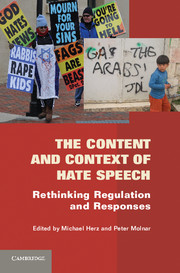Book contents
- Frontmatter
- Contents
- Contributors
- Foreword: Hate Speech and the Coming Death of the International Standard before It Was Born (Complaints of a Watchdog)
- Foreword: Hate Speech and Common Sense
- Acknowledgments
- Introduction
- Part I Overviews
- Part II Refinements and Distinctions
- Part III Equality and Fear
- Part IV International Law
- Index
- References
Foreword: Hate Speech and Common Sense
Published online by Cambridge University Press: 05 June 2012
- Frontmatter
- Contents
- Contributors
- Foreword: Hate Speech and the Coming Death of the International Standard before It Was Born (Complaints of a Watchdog)
- Foreword: Hate Speech and Common Sense
- Acknowledgments
- Introduction
- Part I Overviews
- Part II Refinements and Distinctions
- Part III Equality and Fear
- Part IV International Law
- Index
- References
Summary
Not long after the U.S. Supreme Court decided, by an 8–1 vote, that hateful speech from protestors at military funerals is protected by the First Amendment, the father of the fallen Marine who had brought the case ventured an opinion of his own.
“My first thought,” said Albert Snyder, “was that eight justices didn't have the common sense that God gave a goat.”
There is, as Jeremy Waldron notes in his characteristically incisive contribution to this impressively varied and immensely valuable collection of chapters and interviews, a “weird artificiality” about how we think about hate speech.
All Mr. Snyder had wanted to do was bury his son, Lance Cpl. Matthew A. Snyder, in peace and with dignity. What he endured instead was a protest from a small church that believes God is punishing the United States for its tolerance of homosexuality. Members of the church make this point by appearing at funerals and other public settings with signs bearing messages like “Thank God for Dead Soldiers” and “God Hates Fags”.
“Since when did any of our military die so that a group of people could target their families and harass them?” Mr. Snyder asked me not long before the Supreme Court heard his case. He had won an $11 million jury verdict against the Westboro Baptist Church of Topeka, Kansas, saying the church had caused him emotional distress, but an appeals court reversed, invoking the First Amendment.
- Type
- Chapter
- Information
- The Content and Context of Hate SpeechRethinking Regulation and Responses, pp. xix - xxiiPublisher: Cambridge University PressPrint publication year: 2012
References
- 3
- Cited by



